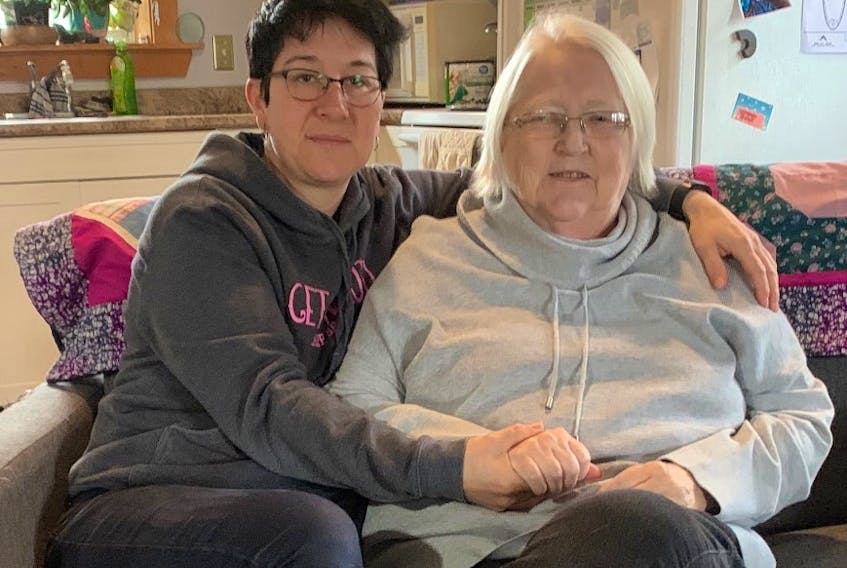ST. PETER'S, N.S. — When Bond Jonas came from British Columbia to see her mother in Cape Breton five years ago, it was meant to be just a visit.
It soon became her life.
“Once I moved in I realized just how bad her state was and I decided to stay,” said the Grand Greve resident who became the primary caregiver to her mother Michele Jonas, 71, who has late-stage Alzheimer's disease.
“I realized that she couldn’t function by herself anymore.”
Bond Jonas has looked after her mother for the past five years, taking on random seasonal jobs to support herself. As her mother’s illness progressed, she found herself spending more time looking after her until about three years ago, it too became a full-time job.
Now, it has all become just too much.
Although Bond Jonas is currently looking for a full-time permanent paying job, she is still looking after her mother. Her mother is on a waiting list for a long-term care home bed but it appears as though she may be on that list for some time yet after being refused at the Richmond Villa. She would prefer her mother be placed at the St. Peter’s facility since it is close to Grand Greve although, at this point, she would accept any appropriate home.
“I’ve been taking care of her for many years and finally as most caregivers do, we reach our limit and I started the process of emergency placement which is difficult in non-COVID times,” Bond Jonas told the Cape Breton Post recently. “But my mother was denied a place at the nursing home because of her dementia and her Alzheimer's is so far advanced, she would be unable to self-quarantine at the long-term care facility.”
Because her mother requires constant care and has a tendency to wander, Jonas said she would be unable to self-isolate by herself at the facility. Jonas is willing to self-isolate with her mother either at home or at the facility and would do everything that is required but says this doesn’t appear to be an option under present public health guidelines, which she finds frustrating.
“How many caregivers are in my situation, where we’re burnt out and we’re unable to function, we’re glued to our loved one’s side 24/7, with no hope of reprieve any time soon,” she said. “It’s quite the situation.”

ADMISSION PROCEDURES
According to the COVID-19 Management in Long Term Care Facilities Directive, under the authority of the chief medical officer of health that was issued April 6, 2020, section 4.4, “there should be no new admissions, transfers or outside non-essential medical appointments during a laboratory-confirmed (COVID-19) outbreak; however, this may not always be feasible.”
Public Health has confirmed that admissions are still taking place into Nova Scotia’s nursing homes, with precautions being taken to ensure this is happening as safely as possible.
But Susan Stevens, director of continuing care for Nova Scotia Health, says the pandemic has affected normal admission procedure.
“We are not in normal time obviously with the pandemic but for so many reasons,” said Stevens. “And when it comes to placement we have been in what we call a province-wide hospital variance since March 16 of last year. So almost a year now and this is unprecedented — I’ve been in continuing care for 25 years now and we’ve never had a situation like this.”
The variance is still in effect.
Admissions are limited to people who fall under the Adult Protection Act, those who can no longer be looked after at home and patients in hospitals awaiting long-term care. Urgent transfers between homes can also be made. Stevens expects the provincewide hospital variance to remain in place until the end of March 2021 and that the situation will continue to be monitored.
“I think the question is, depending on how things continue with the pandemic, will we be able to resume normal placements later this year? Will that be spring, will that be summer, will that be fall,” asks Stevens. “And at this point, it’s hard to know — we’re doing very well in the province — we hope that continues and again we’ll continue to monitor things and make decisions over the next little while.”
While some people are still being admitted, Stevens said there remains a potential for others to be refused
“If a person needs nursing home care, they have complex needs and everybody’s situation is unique and so the nursing homes work very closely with us to ensure they can provide the care that is needed and it’s the right environment,” said Stevens. “And so they can refuse. They can’t refuse and don’t refuse on certain grounds — they can’t refuse because of a person’s gender or sexual orientation or anything like that.
"Where we do see refusals, it is about safety, it is about if this is the right environment and can we provide the level of care and the nature of care in a safe manner for this individual. Often it is related to responsive behaviours and often those behaviours are related to dementia or some combination of mental health issues and dementia or something like that.
“In a pandemic, and with the hospital variance, there are admission protocols that the nursing home must follow that are issued by the department of health and for people who are being admitted from the community into the nursing home they are required to complete a 14-day isolation period. There’s been a lot of measures taken to protect people in nursing homes because of the vulnerability with the virus and so on. This does create some challenges.”
STRESSFUL SITUATIONS
And just because you’ve been refused admission from one nursing home doesn’t mean you won’t get into another, said Stevens.
“A person might be refused at one home because that home for a number of reasons might not be able to provide the care that is required but that doesn’t mean another nursing home might not be able to do that — they might have the right environment and so on. It could lead to a longer wait.”
If a person needs more answers in regards to their own caregiving situation, they can call 1-800-225-7225 to reach an intake co-ordinator who will connect you with your own care co-ordinator or set you up with one.
“Families are dealing with a lot. Caring for someone is stressful at the best of times. We want people to call us whatever their circumstances and we will do our very best to support them and then work through the challenges and find the best solution. It may not be the preferred solution but we are committed to support people as best we can.”
Denise Peterson-Rafuse, executive director of Caregivers Nova Scotia Association, is sympathetic to caregivers like Jonas and others at this time.
“It’s been a very rough time for caregivers,” said Peterson-Rafuse, who lost her own mother last summer when she died in a nursing home.
“I often say sadly we lost people to COVID-19 but we also lost people because of it.”
Elizabeth Patterson is a culture and health reporter at the Cape Breton Post.









